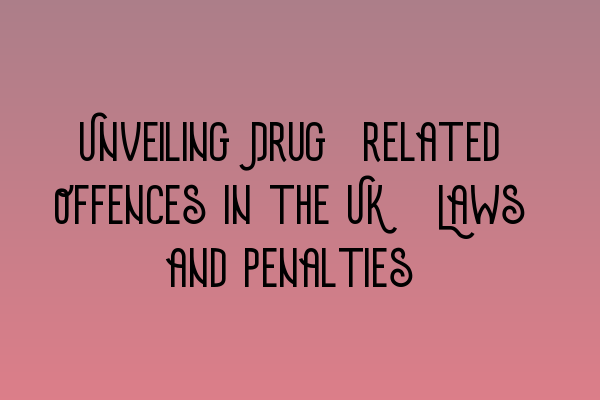Unveiling Drug-related Offences in the UK: Laws and Penalties
Welcome to the SQE Criminal Law & Practice Law UK blog! In this article, we will delve into the laws and penalties surrounding drug-related offences in the United Kingdom. It is important to understand the implications of drug offences, as they can have severe consequences on an individual’s life.
Understanding Drug-related Offences
Drug offences are taken very seriously in the UK, as they pose significant risks to public health, safety, and society as a whole. The Misuse of Drugs Act 1971 is the primary legislation that governs drug-related offences in the UK. This Act categorizes drugs into different classes, ranging from Class A to Class C, based on their potential for harm and abuse.
Drug offences can encompass a wide range of activities, including possession, production, cultivation, supply, and trafficking of illegal drugs. Each of these activities is subject to different penalties and sentences as per the classification of the drug involved.
Penalties for Drug-related Offences
The penalties for drug-related offences vary depending on the severity of the offence, the type of drug involved, and the individual’s role in the offence. Here is a breakdown of the penalties associated with different drug classes:
Class A Drugs
Class A drugs are considered the most harmful and dangerous substances. Offences related to Class A drugs, such as cocaine, heroin, and ecstasy, carry the harshest penalties. Possession of a Class A drug can result in up to 7 years in prison, an unlimited fine or both. Supplying or producing Class A drugs can lead to life imprisonment, an unlimited fine, or both.
Class B Drugs
Class B drugs, including cannabis, amphetamines, and ketamine, have a lower potential for harm compared to Class A drugs. Possession of a Class B drug can lead to up to 5 years in prison, an unlimited fine or both. Supply and production of Class B drugs can result in up to 14 years in prison, an unlimited fine, or both.
Class C Drugs
Class C drugs, such as anabolic steroids and benzodiazepines, are considered to have the least potential for harm. Possession of a Class C drug can result in up to 2 years in prison, an unlimited fine or both. Supplying or producing Class C drugs can lead to up to 14 years in prison, an unlimited fine, or both.
Legal Representation for Drug-related Offences
If you or someone you know is facing drug-related charges, it is essential to seek legal representation to navigate through the complex legal system. Our team at SQE Criminal Law & Practice Law UK has extensive experience in handling drug-related cases and can provide expert advice and representation to protect your rights and achieve the best possible outcome.
For legal advice and representation for drug-related offences in the UK, please click here.
Conclusion
Drug-related offences in the UK are taken seriously and carry significant penalties. It is crucial to be aware of the laws surrounding drug offences and understand the potential consequences. If you find yourself or someone you know facing drug-related charges, seeking legal representation is essential to ensure your rights are protected.
For more information on related topics, please check out the following articles:
- Ensuring Ethical Business Practices: Delaware’s Code of Conduct
- Legal Challenges for UK Businesses in the U.S.: Strategies for Overcoming Hurdles
- UK Criminal Law: An In-Depth Analysis of the British Legal System
- Legal Challenges for UK Businesses in the U.S.: Strategies for Overcoming Hurdles
Thank you for reading our blog post. If you have any questions or require legal assistance, please do not hesitate to contact us.
